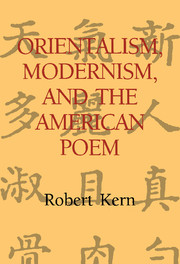Book contents
- Frontmatter
- Contents
- Preface
- 1 Introduction: The European Hallucination
- 2 Emerson and the Language of Nature
- 3 Character Assassination: Representing Chinese in Nineteenth-Century Linguistics
- 4 Otto Jespersen and Chinese as the Future of Language
- 5 Language in Its Primary Use: Fenollosa and the Chinese Character
- Interchapter: Pound, Emerson, and the Poetics of Creative Reading
- 6 Modernizing Orientalism/Orientalizing Modernism: Ezra Pound, Chinese Translation, and English-as-Chinese
- 7 Seeing the World without Language: Gary Snyder and Chinese as American Speech
- Notes
- Index
- CAMBRIDGE STUDIES IN AMERICAN LITERATURE AND CULTURE
Interchapter: Pound, Emerson, and the Poetics of Creative Reading
Published online by Cambridge University Press: 23 December 2009
- Frontmatter
- Contents
- Preface
- 1 Introduction: The European Hallucination
- 2 Emerson and the Language of Nature
- 3 Character Assassination: Representing Chinese in Nineteenth-Century Linguistics
- 4 Otto Jespersen and Chinese as the Future of Language
- 5 Language in Its Primary Use: Fenollosa and the Chinese Character
- Interchapter: Pound, Emerson, and the Poetics of Creative Reading
- 6 Modernizing Orientalism/Orientalizing Modernism: Ezra Pound, Chinese Translation, and English-as-Chinese
- 7 Seeing the World without Language: Gary Snyder and Chinese as American Speech
- Notes
- Index
- CAMBRIDGE STUDIES IN AMERICAN LITERATURE AND CULTURE
Summary
As a subject of recent critical investigation, Ezra Pound's attitudes toward philology, historical scholarship, and history in general have been found to be far from simple. From early on in his career as both poet and critic, Pound's work derives much of its energy from an animus against the scholarly methods in which he was trained, while he himself attempts to make those methods new. For the most part, he derides what he calls “the method of multitudinous detail” in favor of his own method of “luminous detail,” by which he means the effort to discover the truly telling point, whose impact in scholarly discourse is meant to be similar to that of the mot juste in imaginative writing. Indeed, for Pound there is finally no difference between the two, since the mot juste, as he insists, is itself “of public utility.” “Any fact is, in a sense, ‘significant,’ “Pound writes.” Any fact may be ‘symptomatic,’ but certain facts give one a sudden insight into circumjacent conditions, into their causes, their effects, into sequence, and law” (SP, 21–2). It is the “luminous detail,” as opposed to great accumulations of mere data, that can convey not only the essential quality of some past era but even “sudden insight” into the general principles underlying historical change.
This “sudden insight,” moreover, may not be unlike the “sense of sudden liberation” that Pound ascribes to the image, and it is, after all, the “artist,” he tells us, who “seeks out the luminous detail and presents it. He does not comment.
- Type
- Chapter
- Information
- Orientalism, Modernism, and the American Poem , pp. 146 - 154Publisher: Cambridge University PressPrint publication year: 1996
- 1
- Cited by



